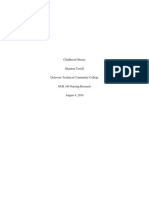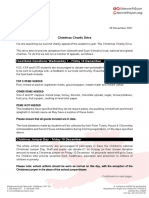Childhood Obesity Speech 3
Childhood Obesity Speech 3
Uploaded by
sepit ketamCopyright:
Available Formats
Childhood Obesity Speech 3
Childhood Obesity Speech 3
Uploaded by
sepit ketamCopyright
Available Formats
Share this document
Did you find this document useful?
Is this content inappropriate?
Copyright:
Available Formats
Childhood Obesity Speech 3
Childhood Obesity Speech 3
Uploaded by
sepit ketamCopyright:
Available Formats
Childhood Obesity Heather Hull November 2007 Introduction Attention: Picture this.
A young girl getting picked on by her friends because she is obese, a boy picked last for a game of kickball because kids feel he will not help the team at all, or a child sitting alone at the lunch table by themselves because they are afraid to sit with other children in fear of getting teased.
Motivation: Do you want this to be your child? With the increase in childhood obesity parents need to take on a major role and help prevent their children from becoming obese. According to in class survey you took, 18 people feel that parents should have the most responsibility in helping the obesity rate in children. Thats 18 out of 23 students. Since most of you are probably going to be parents some day, this number will be very reassuring in knowing you are up to the challenge in preventing childhood obesity. Overview: First off I will explain to you why parents need to take the responsibility in helping childhood obesity. Then, how we will further help the situation and finally what we think about it. With the dramatic increase in childhood obesity, parents need to be responsible and help prevent the issue.
(Thesis)
(Transition) As a parent, helping maintain a healthy diet and promoting good food selection are essential in helping prevent childhood obesity. Body I. Need Step A. There is a need for parents to promote good food selection, healthy diets, and be positive role models to help with childhood obesity. 1. According to the Battle Against Childhood Obesity, The good news is that parents and other caregivers can have a profound influence on children by establishing healthy eating habits (The Battle.. 2005). a. In helping prevent childhood obesity, it is never too early to start. In Pump Up the Family, Researchers believe that a babys first culinary experiences-even before solid foods-could help shape eating habits later on (Kalb, Claudia 2005). i. Women who breastfeed their infants provide many healthy nutrients and a wider variety of tastes.
ii. Breastfeeding also lets the infants have control over how much they consume. b. Also within the early years of a childs life, parents have a role in the amount of food a child intakes and how healthy that food may be. i. In The Future of Children, W. Dietz and L. Stern, say that parents are responsible for offering a healthful variety of foods, while children themselves are responsible for deciding what and how much they want to eat from what they are offered (Gortmaker, Steven 2006). ii. In Pump Up the Family, From a survey done last year of 3,000 infants and toddlers, they found that 1-2 year olds consume about 300 calories more than needed, there are 7 month olds drinking soda, and among 15-24 months, french fries are the most common vegetable (Kalb, Claudia 2005). iii. Parents need to not start offering habits which will be hard to quit such as eating in front of the T.V. and start practicing portion controls. c. As a child becomes older more time is spent away from home, which in turn can encourage obesity. i. In a study done written in The Future of Children, it states, 9 year olds ate dinner with their family half of the time, while 14 year olds ate dinner with their families only a third of the time (Gortmaker, Steven 2006). ii. Parents also need to have healthy food available to their children and reduce the amount of sugar sweetened sodas. 2. Parents also need to limit their control over their childrens eating habits and encouragement. a. According to the Development of Eating Behaviors Among Children and Adolescents it says, Many of the foods that parents encourage children to consume are the fruits and vegetables they would like to see consumed with greater frequency and in greater quantities (LL Birch 1998). b. In contrast many parents like to restrict or forbid the consumption of some foods because they believe it will lead to dislike of that food, but in return, it leads to an increase in liking for that food. 3. Parents also need to be good role models for their children. a. A healthy home is a happy home. According to the Institute of Medicine, Parents are the policy makers at home and they can make the decisions on recreational opportunities, food availability, and many other rules which influence healthful eating (Institute of Medicine). b. Parents can also involve the community to help expand availability for more opportunities of physical activity.
B. Parents also need to promote physical activity to help the obesity rate in children. 1. In Pump Up the Family, One quarter of all adults get no exercise al all, and half of all kids between the ages of 12 and 21 are not vigorously active on a regular basis (Kalb, Claudia 2005). a. Keeping children physically active is a key part of preventing childhood obesity. b. It will lower risks of weight gain and most children who stay physically active will have lower body mass indexes. 2. Parents also need to be supportive of their childrens physical interests and athletics and be involved with them. a. During the early grade school years, parents need to encourage their children to get involved in a variety of physical activities. i. According to the article, Will Your Child be Fat, Kids at this age should get about an hour of moderate to vigorous activity each day, with rest breaks (Sachs, Jessica Snyder 2006). ii. Children can also do various little types of physical activity with their parents such as walking or going on bike rides. b. As children get older physical activity still needs to be continued but at times it can become very competitive. i. According to pediatric exercise physiologist Randy Claytor, in Will Your Child be Fat, he says, Thats unfortunate, as it means that less athletically inclined kids tend to drop out (Sachs, Jessica Snyder 2006). ii. If this happens, you still need to encourage your child to be involved in some type of physical activity so they do not become obese.
(Internal Summary)
As you can see there are various reasons why parents should be responsible in helping prevent childhood obesity. So, if this is all true, then how can we further help the situation?
(Transition) II. Satisfaction Step
A. Because parents know that they have a major role in their childs life, to further help them prevent childhood obesity, I feel that they should set up intervention programs and support groups to encourage each other to help the situation of obesity. B. Of course this is not going to be an easy task. I. In addition to parents helping each other it also needs to be a community wide project. 2. These interventions need to be included in the schools and health services so everybody can be included in them.
(Transition)
My plan will help involve parents more in the problem of obesity so they can become more aware of the situation. Some may still not agree with me, but parents are the biggest part of a childs life and need to be responsible for everything.
III. Visualization Step A. Parents play a huge role in preventing childhood obesity as they can control what their child consumes and what they are doing throughout the day. B. With support groups parents will have the chance to interact with other parents and evaluate how they are doing compared to other parents. 1. Without any extra support, sometimes it might be hard to motivate the parents to try to help their children. 2. They could also give up hope if something is not going right. C. Parents do have the strongest influence on their children, but if everybody gets involves and helps with the problem of obesity it will speed up the process (Transition) Childhood Obesity is a major problem which is still growing and needs to be prevented.
IV. Action Step To help with the problem of childhood obesity, you can take steps to start eating healthier yourself, and to teach other children the risks of obesity. You can also join or start one of the support groups to get more people involved. Conclusion Underview: According to The Future of Children it says, National data indicates that 16 percent of children aged six to nineteen years are overweight (Gortmaker, Steven 2006). Parents need to take a major role in helping prevent childhood obesity.
Last Thought: Childhood obesity is not just an epidemic that is going to disappear. We need to start today to help prevent it. It could be your child that becomes obese. Do you want your childs life to be at risk for a variety of things? Or are you ready and willing to do obesity unfold. Do something about it!
Works Cited The Battle Against Childhood Obesity. Ebony 60.5 (2005). FirstSeach. InfoTrac. Hewes Library, Monmouth College. 13 Nov. 2007 <http://firstsearch.oclc.org/images/WSPL/wsppdf1/HTML/ 03505/LRZUK/6F5.HTM>
Birch, LL, JO Fisher. Development of Eating Behaviors Among Children and Adolescents. Pediatrics 101(1998). Academic Search Premier. EBSCOhost. Hewes Library, Monmouth College. 13 Nov. 2007. <http://web.ebscohost.com> Gortmaker, Steven, Juhee Kim, Ana C. Lindsay, Katarina M. Sussner. The Role of Parents in Preventing Childhood Obesity. The Future of Children. Childhood Obesity. 16.1 (2006):2-9 Institute of Medicine of the National Academics. Parents Can Play a Role in Preventing Childhood Obesity. Preventing Childhood Obesity: Health in the Balance. (2005) <http://64.233.167.104/search?q=cache:XSIIAHyHfEJ:www.iom.edu/File.aspx%3FID%3D22617+Parents+can+play+a+role+in+preventing+child hood+obesity&hl=en&ct=clnk&cd=1&gl=us > Kalb, Claudia, Karen Springen. Pump Up the Family.Newsweek. 145:17 (2005). Academic Search Premier. EBSCOhost. Hewes Library, Monmouth College. 13 Nov. 2007 <http://web.ebscohost.com> Sachs, Jessica Snyder. Will Your Child be Fat? Parenting 20.3 (2006):112-14, 116-17.FirstSeach. InfoTrac. Hewes Library, Monmouth College. 13 Nov. 2007 <http://firstsearch.oclc.org/images/WSPL/wsppdf1/HTML/06555/17W12/1FX.HTM>
You might also like
- M23 Paper 1 - Official Exam Paper - TZ2Document4 pagesM23 Paper 1 - Official Exam Paper - TZ2sealyzon0fpsNo ratings yet
- Childhood Obesity Poster PresentationDocument1 pageChildhood Obesity Poster PresentationAbul Khayer67% (3)
- Male Flex Diet - Cut 160-190Document1 pageMale Flex Diet - Cut 160-190S BrainNo ratings yet
- Access Integrated Project 1Document5 pagesAccess Integrated Project 1Mohini Sharma0% (1)
- Childhood Obesity BookDocument13 pagesChildhood Obesity Bookapi-282235174No ratings yet
- Annotated BibliographyDocument6 pagesAnnotated Bibliographyapi-238017376No ratings yet
- Attachment ReportDocument23 pagesAttachment Reportalex Villnet96% (26)
- Completed Final Paper Preventing Essay On Childhood ObesityDocument10 pagesCompleted Final Paper Preventing Essay On Childhood ObesityJeanne GarvinNo ratings yet
- Childhood Obesity English 102Document6 pagesChildhood Obesity English 102jbell48No ratings yet
- Literature Review EssayDocument11 pagesLiterature Review Essayapi-30219133350% (2)
- Persuasive Essay On Childhood ObesityDocument7 pagesPersuasive Essay On Childhood Obesitywrhkwohjf100% (1)
- Childhood ObesityDocument6 pagesChildhood ObesityShannon TerrellNo ratings yet
- Research Proposal ExampleDocument3 pagesResearch Proposal Exampleapi-339321505100% (1)
- Literature ReviewDocument5 pagesLiterature Reviewapi-609474293No ratings yet
- Homework and Child ObesityDocument8 pagesHomework and Child Obesityafodcauhdhbfbo100% (1)
- Childhood Obesity Research Paper-9Document12 pagesChildhood Obesity Research Paper-9api-548624934No ratings yet
- CriticalessayDocument5 pagesCriticalessayapi-318466863No ratings yet
- Chapter 1 5 Super FinalOther ResearchDocument176 pagesChapter 1 5 Super FinalOther ResearchjeffreyNo ratings yet
- Childhood Obesity Thesis Statement EssayDocument5 pagesChildhood Obesity Thesis Statement Essayangieleeportland100% (1)
- What Is A Good Thesis Statement For Childhood ObesityDocument8 pagesWhat Is A Good Thesis Statement For Childhood ObesityBuyCustomPapersOnlineChicago100% (1)
- Thesis Statement Regarding Childhood ObesityDocument7 pagesThesis Statement Regarding Childhood Obesityufagmcgld100% (1)
- Argumentative Essay On Childhood ObesityDocument4 pagesArgumentative Essay On Childhood Obesityibodduhjf100% (1)
- Does Homework Cause Childhood ObesityDocument5 pagesDoes Homework Cause Childhood Obesityg3z6e4zm100% (1)
- Health Issues Involving Childhood ObesityDocument5 pagesHealth Issues Involving Childhood Obesityapi-610022486No ratings yet
- Final Draft The Epidemic of Child Obesity in America 112514Document14 pagesFinal Draft The Epidemic of Child Obesity in America 112514api-269040739No ratings yet
- Eng 111 Proposal EssayDocument7 pagesEng 111 Proposal Essayapi-491330524No ratings yet
- Child Obesity Revision 5Document13 pagesChild Obesity Revision 5api-29238943No ratings yet
- What Would Be A Good Thesis Statement For Childhood ObesityDocument7 pagesWhat Would Be A Good Thesis Statement For Childhood Obesityafcnhvyoc100% (2)
- Literature Review FinalDocument7 pagesLiterature Review Finalapi-252551056No ratings yet
- Teenage Obesity Thesis StatementDocument5 pagesTeenage Obesity Thesis Statementdwtnpjyv100% (2)
- Annotated Bibliography DraftDocument13 pagesAnnotated Bibliography Draftapi-252551056No ratings yet
- Your Child Is FatDocument5 pagesYour Child Is FatNatasa ZdravkovskaNo ratings yet
- Research ReportDocument6 pagesResearch Reportapi-388128116No ratings yet
- Mackie Shilstone's Body Plan for Kids: Strategies for Creating a Team-Winning EffortFrom EverandMackie Shilstone's Body Plan for Kids: Strategies for Creating a Team-Winning EffortNo ratings yet
- Thesis For Childhood Obesity EssayDocument5 pagesThesis For Childhood Obesity Essayjenniferontiveroskansascity100% (2)
- How To Deal With Child ObesityDocument6 pagesHow To Deal With Child ObesityjayhowNo ratings yet
- Stacey Luneke ResearchfinalDocument9 pagesStacey Luneke Researchfinalapi-309088550No ratings yet
- Annotated Bibliography FinalDocument13 pagesAnnotated Bibliography Finalapi-252551056No ratings yet
- Research EssayDocument10 pagesResearch Essayapi-639504287No ratings yet
- Falkn LitreviewDocument12 pagesFalkn Litreviewapi-242942500No ratings yet
- Shankles-Paf 112 Final PaperDocument7 pagesShankles-Paf 112 Final Paperapi-548632096No ratings yet
- Childhood Obesity Thesis StatementsDocument6 pagesChildhood Obesity Thesis Statementsfczeohief100% (2)
- Child Obesity in America Literature ReviewDocument10 pagesChild Obesity in America Literature Reviewapi-254067841No ratings yet
- Thesis Obesity ChildhoodDocument6 pagesThesis Obesity ChildhoodWriteMyEconomicsPaperCanada100% (1)
- Does Homework Contribute To Childhood ObesityDocument7 pagesDoes Homework Contribute To Childhood Obesitydwfuamapd100% (1)
- Overcoming Childhood Obesity. What You Must Know and How to Do It ProperlyFrom EverandOvercoming Childhood Obesity. What You Must Know and How to Do It ProperlyNo ratings yet
- Obesity Research PaperDocument12 pagesObesity Research Paperapi-318525544No ratings yet
- In many countries, children are becoming overweight and unhealthy. Some people think that the government should have the responsibility. To what extent do you agree or disagree? Sample mẫuDocument1 pageIn many countries, children are becoming overweight and unhealthy. Some people think that the government should have the responsibility. To what extent do you agree or disagree? Sample mẫuCứu NghiênNo ratings yet
- Document 4Document4 pagesDocument 4misbahpatel0919No ratings yet
- Mock Test 5 Overweight and Obese ChildrenDocument21 pagesMock Test 5 Overweight and Obese Childrensara malikNo ratings yet
- Childhood Obesity: Did You KnowDocument32 pagesChildhood Obesity: Did You Knowcris_moreniitaNo ratings yet
- Adolescents and Children With Obesity1Document7 pagesAdolescents and Children With Obesity1LincolnNo ratings yet
- Child Obesity ThesisDocument6 pagesChild Obesity Thesisafknyfene100% (2)
- Childhood Obesity Dissertation ProposalDocument6 pagesChildhood Obesity Dissertation ProposalPayToWriteMyPaperSingapore100% (1)
- Completed ProposalDocument12 pagesCompleted Proposalapi-283243397No ratings yet
- Childhood Obesity and Weight ProblemsDocument2 pagesChildhood Obesity and Weight Problemsnzw8088No ratings yet
- Other NewsletterDocument7 pagesOther Newsletterapi-242247239No ratings yet
- NewsletterDocument5 pagesNewsletterapi-257776463No ratings yet
- Childhood Obesity Essay ThesisDocument5 pagesChildhood Obesity Essay Thesisaouetoiig100% (2)
- Does Homework Lead To ObesityDocument7 pagesDoes Homework Lead To Obesitycfnfwcb3100% (1)
- Can Homework Lead To ObesityDocument5 pagesCan Homework Lead To Obesityafnaetbpeooztd100% (1)
- HomeDocument7 pagesHomesepit ketamNo ratings yet
- Name: - : My Meals Today!Document2 pagesName: - : My Meals Today!sepit ketamNo ratings yet
- Name: - : My Meals Today! List of Foods Consider As Lunch, Breakfast and DinnerDocument1 pageName: - : My Meals Today! List of Foods Consider As Lunch, Breakfast and Dinnersepit ketamNo ratings yet
- Jadual Waktu RBT 4Document1 pageJadual Waktu RBT 4sepit ketamNo ratings yet
- Resume MARY NOBES - HC PractitionerDocument2 pagesResume MARY NOBES - HC PractitionerSteve NobesNo ratings yet
- B3 Biological MoleculesDocument10 pagesB3 Biological Moleculesingrid sihombingNo ratings yet
- Measuring Foraging BehaviourDocument39 pagesMeasuring Foraging BehaviourOriolNo ratings yet
- Tle Cookery 10: Tools, Utensils, and Equipment Needed in Egg PreparationDocument2 pagesTle Cookery 10: Tools, Utensils, and Equipment Needed in Egg PreparationEmmanuel SorianoNo ratings yet
- The Running Guru Runner's Training GuideDocument25 pagesThe Running Guru Runner's Training GuideJoão Santos100% (1)
- Sandy ReportDocument15 pagesSandy ReportAditya PatelNo ratings yet
- Nutrition Training ManualDocument86 pagesNutrition Training ManualdennysonNo ratings yet
- Manual On Evacuation Camp Management DraftDocument47 pagesManual On Evacuation Camp Management DraftTelNo ratings yet
- Annelina Waller - Mix Yourself HappyDocument96 pagesAnnelina Waller - Mix Yourself HappyGeraldyneNo ratings yet
- Health7 - Q2 - Mod5 Layout v1.0Document23 pagesHealth7 - Q2 - Mod5 Layout v1.0Juliet Autriz FaylognaNo ratings yet
- School Form 8 SF 8vultureDocument2 pagesSchool Form 8 SF 8vultureDazzelle BasarteNo ratings yet
- Diet Theory EDocument2 pagesDiet Theory EKacper M.No ratings yet
- FC1 Videos 2Document12 pagesFC1 Videos 2Aaron NavarreteNo ratings yet
- Why Are Food Trucks Better Than Restaurants?Document6 pagesWhy Are Food Trucks Better Than Restaurants?Twisha MehtaNo ratings yet
- Malunggay Makes A Golden Comeback - EditedADocument25 pagesMalunggay Makes A Golden Comeback - EditedAjayroldparcedeNo ratings yet
- Sample Report Eating HabitsDocument20 pagesSample Report Eating HabitsAISYAH ASRULNo ratings yet
- Obesity PresentationDocument25 pagesObesity Presentationnarendrakcr32No ratings yet
- Food Bank Donations: Wednesday 1 - Friday 10 December: Christmas Charity DriveDocument2 pagesFood Bank Donations: Wednesday 1 - Friday 10 December: Christmas Charity DriveisleworthsyonNo ratings yet
- 3rd Semester Microbiology PDF Notes - Bright MedicoDocument77 pages3rd Semester Microbiology PDF Notes - Bright Medicorun.jhun829100% (1)
- K To 12 AdvocacyDocument49 pagesK To 12 Advocacyחוֹלִי מנאלו נָמוּךNo ratings yet
- Food Combination Trial 3Document2 pagesFood Combination Trial 3El Shaira RizzoNo ratings yet
- TITLE: Cognitive Decline: Can Diet Be A Preventive or Treatment Option? AUTHOR: Nursing Older People (2014)Document10 pagesTITLE: Cognitive Decline: Can Diet Be A Preventive or Treatment Option? AUTHOR: Nursing Older People (2014)Dranlie LagdamenNo ratings yet
- Institución Educativa Técnico Superior Industrial: Reading ExerciseDocument2 pagesInstitución Educativa Técnico Superior Industrial: Reading ExerciseJuan Camilo Molano SinucoNo ratings yet
- WS4 Standardized Hospital DietsDocument16 pagesWS4 Standardized Hospital DietsJhoneric Vencer EscultorNo ratings yet
- Macrobrachium Rosenbergii Popularly Known As 'Scampi' Has: Nutrients Requirement Growth StagesDocument3 pagesMacrobrachium Rosenbergii Popularly Known As 'Scampi' Has: Nutrients Requirement Growth StagesSudip SahaNo ratings yet
- Module 1 CafeteriaDocument5 pagesModule 1 CafeteriaMary Joy RellonNo ratings yet





























































































